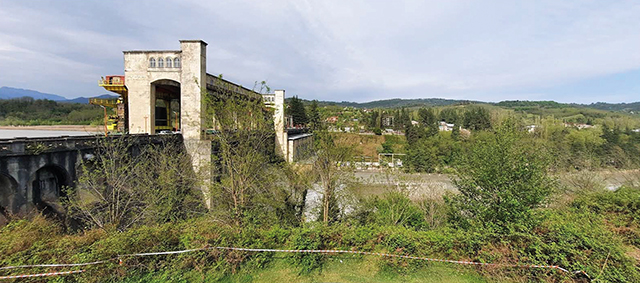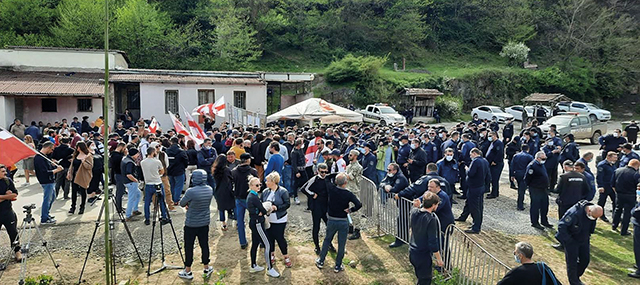For over 180 days, a fluid alliance of locals, environmentalists, and those sympathetic to the region’s preservation have come together to oppose the construction of a large hydroelectric power plant in the northwestern Georgian mountains. This alliance, known by many names but often collectively as the “Guardians of the Rioni Valley,” has brought their case into the public eye with increasing popular support.
Many in the government, and even some in the general public, have brushed off this growing movement as a rabble of “hippies” that are not considering the intricate engineering details and infrastructure benefits. However, upon closer observation and examination, there seems to be far more behind their rhetoric. This opposition filters its complaints into layers that contain ecological, humanitarian, and democratic process concerns.
A recent assessment of the Rioni Valley’s ecosystem showed there has been an almost continuous observation of the area since the late 1930s. With a total length of almost 330 kilometers, the river has been an important feature since pre-Roman times. Originally having the name of the River Phasis, it continues to be the longest river in modern Georgia.
The proposed construction project is estimated to affect 8.5 to 9 kilometers of the river, and along this stretch of territory the width of the affected area ranges from 50 meters to 350 meters from the river. This land includes 58 hectares of agricultural land, some of which is used to cultivate the famous Tvishi variety of Georgian wine. The hundreds of flora varieties range from common species found all over the country, to eight species labeled as Vulnerable by the International Union for Conservation of Nature (IUCN).
In addition to these flora species at risk, the project area also encompasses hundreds of fauna inhabitants. Four protected species of animals make their home in the project valley; Brown bear (Ursus arctos), lynx (Lynx lynx), otter (Lutra lutra) and Caucasian squirrel (Sciurus anomalus). Their habitats and livelihoods are threatened by the construction and rising river levels as a result of the completed project. In addition, 18 bat species are distributed through the project area and surrounding region, while two endangered bird species also inhabit the valley. Egyptian Vulture and the Steppe Eagle both make homes in the area, as well one protected reptile, the Caucasus Viper. In total, many hectares of land, animals, and local flora stand to be threatened by the project and its side effects.
The Guardians have made their case that the project also affects the people living there. Three whole villages and part of another are being forced to vacate, with residents offered a nominal sum in compensation. This sum is reported to be around 100,000 and 200,000 Georgian Lari.
Many involved with the Guardians protest have noted that this sum is not enough to purchase a new home in many areas into which they would be relocated. In addition to this, it is noted that these people, many of whom have lived in these villages for many decades, are not accustomed to living in a city apartment. The future of their village-specific assets has not been considered, such as livestock, machinery, and accompanying property.
The Guardians also note that many of the residents of these villages have been deceived into believing that their only option was to accept the compensation package and move. According to them, the villagers were coaxed to believe that the government, through police enforcement, would acquire the land regardless of their disposition on the matter. However, leaders of the movement have said that this is far from the truth, as their movement has gained enough traction to stall the development of the valley.

Proponents of the project take a different approach. Some have noted that the development of hydroelectric power plant projects in Georgia provide a wide range of benefits, not only to the people themselves but also the security and welfare of the nation.
Energy independence is a massive benefit for any nation. Being bonded to another, even an ally, to source energy is a massive burden for both diplomatic leverage but also national security and defense. It’s no secret that Kremlin-controlled oil and gas companies use their leverage in energy to pressure Europe and other regions to bend to their will. This is a serious compromise of global security and could spell long-term doom for NATO and those who stand against Russian aggression.
The project also aims to bring a wide range of jobs and an economic boost to a region of Georgia that is largely underserved. With a high unemployment rate, the area could benefit from skilled and unskilled labor opportunities. This economic boost stands to bring the local economy and standard of living to a new higher level. In addition, the tax revenue generated from all of this development could provide a base for Kutaisi and other municipalities to refurbish and grow.
Recently, a court decided that Turkish construction company Enka did not make an adequate environmental assessment of its HPP’s impact on the region, however, this could only be the beginning of a new battle for the Guardians. It’s unlikely a corporate giant such as Enka will shy away from millions in potential revenue, nor will those in the government who stand to benefit from this project.
Some members of the government and European community have voiced their support for the Guardian movement. However, the movement has yet to achieve all of their goals, restricted by the police deployment in the area preventing all movement to the construction zone.
While the vigor and enthusiasm is visibly strong on the ground near Gumati, it has yet to be seen if the government will allow the Guardians a seat at the proverbial, and occasionally literal, table. Leaders of the movement, while colorful in their description of the problems, have summarized their complaints as needing an equal voice with the government and not to be silenced undemocratically.
While Enka still holds the financial majority, it is the voice of the people that can often pull more power. Associated demonstrations across the nation have been organized in solidarity with the Guardian’s movement, and more and more notice is being taken in government circles. While it is true that time will only tell, the traction the movement has gained is starting to have more influence in the higher echelons in the government and the courts.
Blog by Michael Godwin














